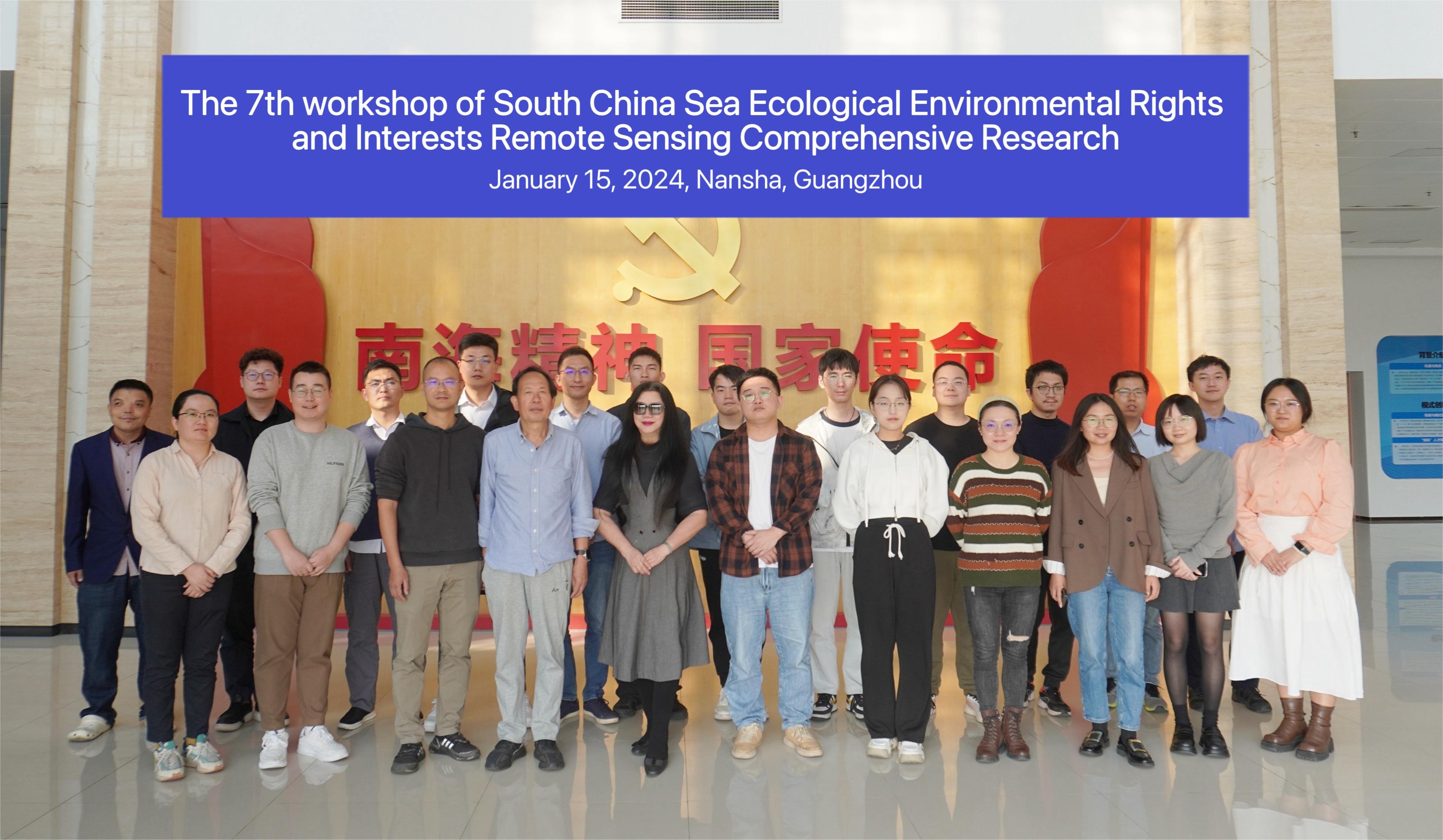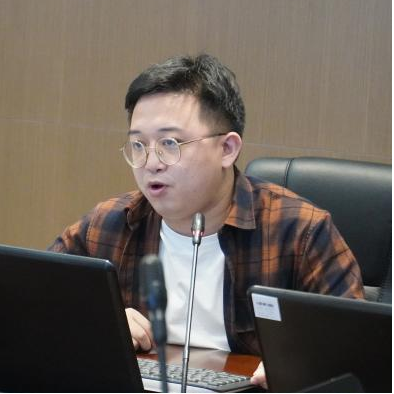The 7th workshop of South China Sea Ecological Environmental Rights and Interests Remote Sensing Comprehensive Research was successfully held in Guangzhou
发布时间:2024-1-15

The 7th workshop of South China Sea Ecological Environmental Rights and Interests Remote Sensing Comprehensive Research, focusing on 'Ecological Remote Sensing and Marine Ranching,' was held successfully in Nansha District, Guangzhou, on January 15, 2024. This workshop was hosted and meticulously organized by Prof. Tang Danling from the Southern Marine Science and Engineering Guangdong Laboratory (Guangzhou).
The workshop was structured around three pivotal themes: Marine Ranching, Marine Environment, and Marine Ecological Remote Sensing. Distinguished Prof. Yang Hongsheng from the Institute of Oceanology, Chinese Academy of Sciences delivered a keynote address, highlighting the workshop's significance. Additionally, insightful presentations were contributed by Dr. Sui Yi and Dr. Tuo Pengfei, representing Prof. Chen Shengli's team from Tsinghua University Shenzhen International Graduate School. The session also featured in-depth research reports by Dr. Zhu Xiaohui and Dr. Yu Yan from the U-team of the Southern Marine Science and Engineering Guangdong Laboratory (Guangzhou), further enriching the discourse. The workshop attracted over 50 scholars and researchers, who joined both online and in person, demonstrating a wide-ranging interest in the topics discussed.
The workshop opened with a 'Marine Ranching' session, expertly chaired by Prof. Tang Danling. A highlight was Prof. Yang Hongsheng's keynote, "The Past and Present Life of Marine Ranching," which offered a deep dive into the evolution of marine ranching. He traced its development from traditional practices (Marine Ranching 1.0) through to marine ecological ranching (Marine Ranching 2.0), and onto the current frontier of global aquatic ecological ranching (Marine Ranching 3.0). This evolution underscores the shift towards digitally-enhanced methodologies—leveraging data to foster intelligent management and operational paradigms. Prof. Yang emphasized the pivotal role of the seed industry in this new era, advocating for an integrated approach that spans ‘conservation, breeding, testing, propagation, and promotion’. The session sparked lively discussions among attendees, both in-person and online, indicating a robust interest in the subject matter.
The workshop's afternoon session (Session 2 and 3) was conducted exclusively in English, under the leadership of Associate Prof. Wang Jiujuan from the Southern Marine Science and Engineering Guangdong Laboratory (Guangzhou), along with Assistant Prof. Chen Shengli and Dr. Sui Yi from Tsinghua University Shenzhen International Graduate School.
Session 2 focused on the Marine Environment, featuring specialized presentations that underscored the session's global relevance and scientific depth. Dr. Sui Yi presented on 'Intense Lateral Intrusion of Offshore Sub-Surface Waters in Halifax Harbour, Halifax' detailing the complexities of water movement in Halifax Harbour. Dr. Tuo Pengfei explored the 'Seasonally Dependent Influences of Pacific Meridional Modes on Basin-wide SST Variability in the South China Sea,' offering insights into temperature variability across the South China Sea. Furthermore, Ph.D. student Deng Shaokun contributed with a study on 'Numerical Study of An Autumn Tropical Cyclone Intensification by Offshore Wind Farms in the Northern South China Sea,' highlighting the interactions between human-made structures and natural meteorological phenomena. Each report, delivered by members of Tsinghua University Shenzhen International Graduate School, contributed to a nuanced understanding of marine environmental challenges and dynamics.
Delving into the last session ‘Marine Ecological Remote Sensing’, the workshop presented groundbreaking research that leverages advanced technologies to understand and protect marine ecosystems. Ph.D. candidate Cui Hongxing introduced a novel application of machine learning to predict sea surface temperature changes triggered by tropical cyclones, showcasing the potential of AI in environmental forecasting, titled 'Predicting Tropical Cyclone‐Induced Sea Surface Temperature Responses Using Machine Learning.' Dr. Zhu Xiaohui's report, titled 'Illuminating the Depths', revealed the intricate global patterns of CDOM (Chromophoric Dissolved Organic Matter) photobleaching, highlighting the critical role of remote sensing in uncovering oceanic processes. Lastly, Dr. Yu Yan's study on the 'Remote Sensing Monitoring Methods and Diffusion Rule of Spartina Alterniflora in Western Guangdong' offered insights into the spread of this invasive species, demonstrating the application of remote sensing in managing marine biodiversity. These reports by the U-team from the Southern Marine Science and Engineering Guangdong Laboratory (Guangzhou) underscore the cutting-edge advancements in remote sensing technologies for marine ecological studies.
The workshop's keynote report offered a comprehensive overview of marine ranching's evolution, spotlighting pivotal technological breakthroughs that pave the way for its future. Participants left with an enriched understanding of marine ranching, thanks to thorough discussions that spanned both historical developments and cutting-edge innovations. Moreover, the event fostered stronger ties among leading research institutions, including the Southern Marine Science and Engineering Guangdong Laboratory (Guangzhou), Tsinghua University Shenzhen International Graduate School, the Institute of Oceanology, Chinese Academy of Sciences, among others. This collaborative atmosphere is poised to accelerate scientific research and the advancement of marine ranching in China. Beyond showcasing significant technological progress, the workshop laid the groundwork for future joint research initiatives, heralding a new era of innovation in marine ecology and sustainable development. It represents a crucial leap towards solving contemporary challenges in marine conservation, ensuring the sustainability of marine resources for future generations.

.png)
Prof. Yang Hongsheng(left) Assistant Prof. Chen Shengli(right)
.png)
.png)

Dr. Sui Yi(left) Ph.D. candidate Cui Hongxing(middle) Dr. Tuo Pengfei(right)



Dr. Zhu Xiaohui(left) Ph.D. student Deng Shaokun(middle) Dr. Yu Yan(right)
中文版新闻:第七届南海生态环境权益遥感综合研究研讨会在广州顺利召开
